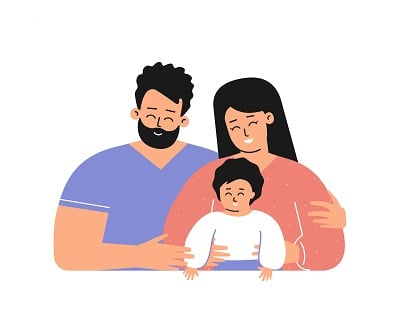
ADAA is committed to highlighting the importance of culture, identity and inclusion for the incredibly diverse community members who have roots in Latin America. ADAA will use the term Latiné1 to further our commitment to inclusion and our acknowledgment of identity within the community. Culture and heritage have historically remained important to the community. However, having to uphold these traditional norms can often include the stress of being held to extremely high standards, pushed to work hard, or even told not to speak Spanish in public to avoid experiences of judgment or discrimination. These stressors can eventually cause mental health struggles that should be addressed and not silenced.
Ultimately, it is important to note that ADAA wants to provide a space where all individuals can learn more about anxiety and depression while having the right to identify with language that captures who they are and makes them feel welcome. Click here to translate this page to Spanish.
ADAA encourages you to share your story about identity and mental health here.
- Understanding Mental Health
- Overcoming Barriers to Mental Health Care
- Finding The Right Therapist
- Recursos en Español
- ADAA Grupo de Apoyo en Línea
- ADAA Resources
- Additional Community Resources
1. Why Latiné? Compared to the term Latinx that was created as a gender-neutral alternative to Latino or Latina, the term Latiné also removes gender from Spanish, by replacing it with the gender-neutral Spanish letter E. The term Latiné pushes beyond gender binaries and acknowledges the intersecting identities of the community, which includes men, women, gender non-conforming, non-binary, trans, queer, agender and gender-fluid individuals.
Understanding Mental Health in the Community
While Latiné communities can be impacted by the same mental health disorders as other communities — including generalized anxiety disorder, major depression, posttraumatic stress disorder (PTSD), and alcoholism — they experience additional health disparities such as access and quality of treatment that can affect the way they receive mental health care. With over 61 million Latinx/Hispanic individuals living in the U.S, nearly 10 million of those people are living with mental health conditions.8 While Only 20% of the Latiné community who experience symptoms of a psychological disorder talk to a doctor about their symptoms and only 10% contact a mental health professional.

Although evidence-based treatments for depression and anxiety disorders such as Cognitive Behavioral Therapy (CBT) show effectiveness in Latiné populations, the community underutilizes these treatments.2 Members of the Latiné community have expressed greater comfort in speaking to primary care physicians or mental health professionals concerning mental illness compared with the White community.6 Regardless, there are still many socioeconomic disparities that impact the Latiné community with approximately 34% of Hispanic/Latiné adults with mental illness receiving treatment each year compared to the U.S. average of 45%, due to many unique barriers to care.7
Overcoming Barriers to Mental Health Care

The Impact of Silence
There are a few barriers within the community that can hinder proper mental health care treatment. One of the main barriers is silence. There is a stigma surrounding mental health and illness that causes members of the Latiné community to remain silent about mental health issues in fear of embarrassment or shame. Also, as religion is so important to the culture, the community members experiencing issues might choose to seek out prayer or faith-based solutions rather than clinical treatment. Unfortunately, the silence only compounds the range of experiences such as immigration, acculturation, trauma, and generational conflicts5 that may result in mental health struggles.
Language Barriers
Another large barrier to treatment and care within the community is language. There can be uncertainty about how to access services for themselves or for their loved ones because of language barriers - not only because many medical professionals do not speak Spanish, but also because there is a lack of health professionals that identify as Hispanic/Latiné. Unfortunately, those that do not can have a hard time understanding the cultural issues that Latiné communities face. It is also important to note that other barriers can include lack of health insurance, legal status, and misdiagnosis.1
Finding the Right Mental Health Provider

It is important to find a provider who demonstrates an understanding of culture and identity within Latiné communities. Cultural competence or understanding is necessary when providing quality care and support. Research has shown that a lack of cultural competence in mental health care can result in misdiagnosis and inadequate treatment.
When meeting with a potential provider, whether it be a mental health professional or a primary care doctor, ask questions to get a sense of their level of cultural sensitivity:
- Have you treated other members of the Latiné community?
- Have you received training in cultural competence?
- How do you plan to take your beliefs and practices into account when suggesting treatment4?
- It may also be beneficial to ask whether there are Spanish-speaking professionals available in their practice if that helps you feel more welcomed and heard.
Learn more about finding the right therapist.
Below are resources where you can find help from Latiné/Hispanic mental health providers:
- Latinx Therapist Action Network
- Latinx Therapy Podcast
- The Latinx Mental Health Podcast
- Find a Hispanic/ Latinx Therapist—Directory
- Hispanic Family Counseling
- Latinx Therapy
- Melanin and Mental Health—Latinx Directory
- Therapy for Latinx
ADAA Recursos en Español
ADAA Encuentre Soporte en Línea
 ADAA tiene un grupo de apoyo en línea anónimo que es uno a uno. Este grupo de apoyo es un lugar amigable y seguro para que las personas compartan sus experiencias con la salud mental. Como miembro, puede conectarse con otras personas que experimentan ansiedad y depresión y trastornos relacionados, contribuir a conversaciones en curso o iniciar su propia conversación con una pregunta o publicar una historia sobre su experiencia.
ADAA tiene un grupo de apoyo en línea anónimo que es uno a uno. Este grupo de apoyo es un lugar amigable y seguro para que las personas compartan sus experiencias con la salud mental. Como miembro, puede conectarse con otras personas que experimentan ansiedad y depresión y trastornos relacionados, contribuir a conversaciones en curso o iniciar su propia conversación con una pregunta o publicar una historia sobre su experiencia.
Haga clic aquí para suscribirse hoy.
ADAA Resources
These ADAA resources—blog posts, webinars, articles, and community stories—provide helpful information, support, and opportunities to learn more about mental health within Latiné/Hispanic communities.
From ADAA professionals:
- Recursos en Español
- Trastorno de Ansiedad Social
- ¿Qué es la depresión?
- ¿Por que tenemos temor/estigma en buscar ayuda para nuestra salud mental?
- ADAA Grupo de Apoyo en Línea
- El Rostro del Trauma en la Comunidad Latina
- Qué Nervios: Being Latina and Dealing with Anxiety
- Qué Nervios: tener ansiedad siendo Latina
- Trastornos de Ansiedad
- Videos Psicoeducativos Españoles
- La importancia de la salud mental y la identidad de las comunidades Latiné/Hispana
- I am a Scientist, but Most Importantly, I am a Human Being
- Long Live the King
- So OCD
- Antonio Liranzo - Mental Health Awareness Month Video
Additional Mental Health Support
- American Society of Hispanic Psychiatry
- Caminar Latino
- Esperanza United
- Estoy Aqui
- Latino Equality Alliance
- UnidosUS
- Yo Soy Ella
Trending Articles
2020-2022:
- How some therapists are helping patients heal by tackling structural racism, NPR, Nov 2022
- I Spent 20-Plus Years Battling Severe Obsessions Before I Was Diagnosed With OCD, Popsugar, Oct 2022
- 4 Tips for Talking to Your Latino Parents About Mental Health, KQED.org, Feb 2022
- Afro-Latinx Líderes Avanzando Fellow Orestes Marquetti Explains His Passion for Destigmatizing Mental Health, Unidous.org, Feb 2022
- Digame: Adriana Alejandre is Helping Make Mental Health Care Accessible for Latinxs, HipLATINA, Jan 2022
- Its Hard to Search for a Therapist of Color: These Website Want to Change That, NYTimes.com, July 2021
- Paola Ramos on Latinx Youth Resiliency from her Forthcoming Book: Finding Latinx: In Search of the Voice Redefining Latino Identity. Teen Vogue, 2020
- People of Color Face Significant Barriers to Mental Health Services, CNN.com, 2020
- Understanding Mental Illness in the Latinx Community Al Dia News, 2020
- What to know about Mental Health Conditions and the Latinx Community, Medical News Today, Sept 2021
- Why We Should Be Talking about Mental Health among Latinx Communities Urban Institute, Oct 2020
- National Alliance on Mental Illness (NAMI). Hispanic/Latinx. Nami.org. https://www.nami.org/Your-Journey/Identity-and-Cultural-Dimensions/Hispanic-Latinx
- National Center of Biotechnology Information (NCBI). Treatment Engagement and Response to CBT Among Latinos with Anxiety Disorders in Primary Care. Pubmed.ncbi.nlm.nih.gov. https://pubmed.ncbi.nlm.nih.gov/24660674/
- Medical Mistrust, Perceived Discrimination, and Satisfaction with Health Care Among Young-Adult Rural Latinos, NCBI
- National Alliance on Mental Illness (NAMI). Hispanic/Latinx. Nami.org. https://www.nami.org/Your-Journey/Identity-and-Cultural-Dimensions/Hispanic-Latinx
- Mental Health America (MHA). Latinx/Hispanic Communities And Mental Health. Mhanational.org. https://www.mhanational.org/issues/latinxhispanic-communities-and-mental-health
- Wiley Online Library. Stigmatizing Attitudes Toward Mental Illness Among Racial/Ethnic Older Adults in Primary Care. Wiley.com. https://onlinelibrary.wiley.com/doi/10.1002/gps.3928
- National Alliance on Mental Illness (NAMI). Hispanic/Latinx. Nami.org. https://www.nami.org/Your-Journey/Identity-and-Cultural-Dimensions/Hispanic-Latinx
- file:///Users/tiaraj./Desktop/2022-BIPOC-MHM-Toolkit.pdf











